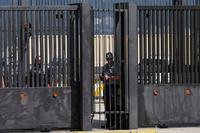Veterans Affairs Secretary Bob McDonald plans to travel to Boston on Friday as part of a White House post-State of the Union messaging effort to promote administration accomplishments over the past seven years and discuss challenges still ahead.
In addition to McDonald, the White House will be sending other Cabinet secretaries and senior administration officials on the road for what it calls the "State of the Union Cabinet in Your Community Tour."
"The tour is an opportunity for local residents to interact with, and to hear from, members of the President's Cabinet about the issues that matter most -- from climate change to the health and safety of their communities to educational and economic opportunity," presidential assistant and cabinet secretary Broderick Johnson wrote in a lengthy White House blog posting on Sunday.
On Wednesday, Secretary of State John Kerry will speak at the National Defense University in Washington, D.C., on 2016 foreign policy priorities, and then visit a refugee resettlement center to meet with refugees and hear from the center's staff about their work in helping refugees integrate into American life.
That same day, Defense Secretary Ash Carter will head to Fort Campbell, Kentucky, to speak to soldiers of the 101st Airborne Division that are slated to deploy to Iraq to train, advise and assist Iraqi security forces fighting the Islamic State in Iraq and Syria, or ISIS, also known as ISIL. Afterward, he'll head to Florida to meet with U.S. Central Command and U.S. Special Operations Command leaders about the campaign against ISIL.
In the case of McDonald, he plans to visit the VA Regional Medical Center in Boston's Jamaica Plain neighborhood to highlight the agency's mental health, post-traumatic stress disorder and traumatic brain injury research, VA spokeswoman Victoria Dillon said on Monday.
The high numbers of troops who suffered head injuries -- often from blasts from improvised explosive devices, or IEDs -- have prompted the VA to pour more resources into PTSD and TBI research. At the same time, suicides among veterans have increased dramatically over the past decade, with an average of 22 vets taking their lives each day, according to department figures.
More than three quarters of wounded veterans are dealing with PTSD, according to an annual survey released in November and sponsored by the Wounded Warrior Project.
Steve Nardizzi, chief executive officer for the group, said more than 23,000 registered WWP members completed the survey, making it the largest collection of data on the post-9/11 generation of wounded vets yet collected.
"Our annual survey shows that this generation of injured veterans continues to struggle with the invisible wounds of war, including PTSD and TBI, and the challenges are not getting better with time," Nardizzi said in November.
The VA Medical Center in Boston is one of four National Centers for Excellence for PTSD.
While in Boston, McDonald will present the John Blair Barnwell award to Terence M. Keane, director of the Behavioral Science Division of the National Center for PTSD, recognizing him as a world leader in the field of traumatic stress, Dillon said.
Keane is also a professor of psychiatry and psychology and the assistant dean for research at Boston University School of Medicine. The award is named for educator and physician-scientist Dr. John Blair Barnwell, who was director of Research and Education at the VA 1940s.
Dillon said McDonald also will meet with TBI expert Dr. Ann McKee, director of the neuropathology service for Veterans Integrated Network System 1 and the Brain Banks for the Boston University Alzheimer's Disease Center, Chronic Traumatic Encephalopathy Center, Framingham Heart Study, and Centenarian Study -- all based at the VA Medical Center in Bedford, Massachusetts. She is also the chief neuropathologist for the National VA ALS Brain Bank.
"Research conducted at the VA Brain Bank in Boston is enormously important to the future mental health of many veterans and civilians," Dillon said. The VA also operates there a brain bank for research into Chronic Traumatic Encephalopathy, or CTE -- the progressive degenerative brain disease found among athletes and others -- such as service members who experienced brain trauma repeatedly.
"The VA CTE Brain Bank ... is primarily focused on furthering our understanding of mild traumatic brain injury," she said.
Dillon said that McDonald also will take the opportunity while in Boston to speak with mental health medical students, nurses and social workers, to encourage them to work at the VA.
-- Bryant Jordan can be reached at bryant.jordan@military.com. Follow him on Twitter at @bryantjordan.




























